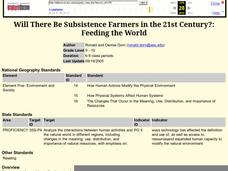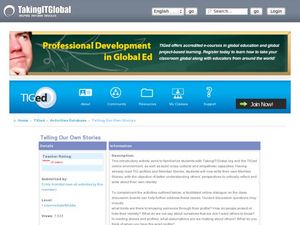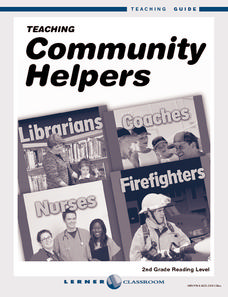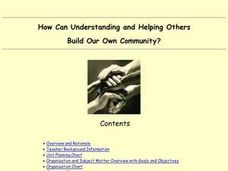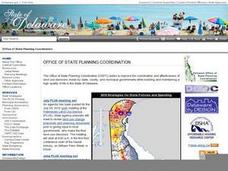Curated OER
Don't Call Me A Pig
First graders explore wildlife and habitats in the Arizona desert. Throughout a classroom discussion, 1st graders observe pictures of the desert and animals that live there. As they go on a nature walk around the school, students...
Curated OER
Resources and Economic Development
Identify natural resources in the world and how they translate into economic development. In this global economy instructional activity, your class will utilize the Internet to view an Oregon Time Web which they research to examine the...
Rutgers University
How the Allies Won World War II: Island-hopping in the Central Pacific
Using primary source documents, young historians explore the strategies the US used to defeat Japan during WWII. They also learn about the American military experience, and innovations that changed the style of warfare. Young scholars...
Curated OER
Globalization and Consumerism
Is the expansion of American corporations abroad a good or bad thing? After examining the global operations of Ford Motor Company, McDonald's, and Walmart, class members are asked to evaluate the impact of globalization and consumerism.
Curated OER
How To Make an Apple Pie and See the World
Students have a class discussion on how the variety of foods we use on a daily basis come from all over the world. They identify foods that they are familiar with that come from other places.
Curated OER
Will There Be Subsistence Farmers in the 21st Century?: Feeding the World
Students examine the topic of subsistence farming. They research the future of subsistence agriculture, identify the types and locations of subsistence agriculture, and write about subsistence farming in regards to developing nations and...
Curated OER
Solving the Puzzle
Students create a map showing the United States borders at a specific period in history and produce three questions to be answered by examining the map. They also write a productive paragraph explaining who, what, when, where, how/why a...
Curated OER
A Matter of Accountability
Pupils conduct a mock trial focusing on environmental accountability of industrialized nations. As an example, they evaluate evidence provided on carbon dioxide emissions. They participate in a mock trial of industrialized nations by the...
Curated OER
Site vs. Situation: Location! Location! Location!
Students examine places with a similar latitude to Alabama, and discuss the importance of a location's site versus its situation. They analyze maps, create a chart, and write a paragraph on the difference between site and situation.
Curated OER
Check Out Community Preparedness
Young scholars research storm preparedness in local community, identify ways citizens are notified of impending weather emergencies, contact city administrators to discuss disaster plan and whether it has ever been implemented, and...
Curated OER
Telling Our Own Stories
Explore online profiles and social media with your middle and high school classes. Use blogs to inspire your class to craft a well-written, thoughtful response to a prompt you give. A few example prompts are given.
Agriculture in the Classroom
Understanding the Columbian Exchange Through Old World and New World Foods
If you're interested in teaching your class about the impact of the Columbian Exchange on contemporary society, this is worth a look. The plan begins with an introduction to the topic, which stems from a cell phone poll...
Lerner Publishing
Teaching Community Helpers
Youngsters discover who the leaders in their community are and what it means to build a community in this four-lesson unit.
Curated OER
Native Americans
Students, in groups, research various Native American tribes. They wirte a report about the tribe which includes information about their food and ceremonies, among other things. They create a diorama and a poster that shows how they...
Curated OER
America the Beautiful
Young scholars listen to a read-aloud discussing the landmarks of the United States. In pairs, they use the internet to research a landmark of their choice. They create a visual aid to be given with a presentation sharing the...
Curated OER
Conditions in And Connections To Indonesia
Eleventh graders research an animal and its habitat, the conditions of that habitat and how its connections to the rest of the world are affecting that habitat.
Curated OER
Because We Can, Should We?
Young scholars identify a position on an issue of geographic importance and support it They read the story "By the Waters of Babylon," and write a paragraph explaining what they think the relationship between Babylon and the Biblical...
Curated OER
How Can Understanding and Helping Others Build Our Own Community?
Students examine the different cultures and disabilities people face in their community. They discuss how they can become better citizens. They answer discussion questions to finish the lesson.
Curated OER
The Geographic Doctor Seuss
Learners define the term region using semantic mapping, listen to the Dr. Seuss story Yertle the Turtle, and discuss the conflict over borders in the story. They draw a map divided into regions.
Curated OER
As Simple as Beans: Canada's Population
Students gather facts about Canada from various maps. In this Canada lesson, students use beans to relate the populations of the U.S. and Canada. Students create population distribution maps based on the placement of the beans.
Curated OER
"Where in the World is my School?"
Students learn new vocabulary and discuss what GPS is and does. They locate their school using the equipment.
Curated OER
Lesson 1: Culture and Resource Use
Students research an aspect of Wabanaki culture that has persisted in Maine throughout the years. They write a conversation between a Wabanaki person and an English person that shows the different cultures and negotiates a solution to a...
Curated OER
Dark and Beautiful Caves
Students research how caves form. They describe the major stone formations in caves by taking notes. They construct a clay model of a cave and mark each formation making it easy to identify in the legend.
Curated OER
Maine: A Place Apart?
Students list phrase that describe Maine from both an insider's and outsider's point of view. They create an exhibit on Maine's history and write an essay about Maine's image as "a place apart."







